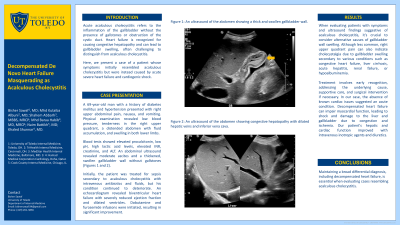Monday Poster Session
Category: Biliary/Pancreas
P1841 - Decompensated Heart Failure Masquerading as Acalculous Cholecystitis
Monday, October 28, 2024
10:30 AM - 4:00 PM ET
Location: Exhibit Hall E

Has Audio
.jpg)
Bisher Sawaf, MD
University of Toledo
Toledo, OH
Presenting Author(s)
Mhd Kutaiba Albuni, MD1, Bisher Sawaf, MD2, Shahem Abbarah, MD3, Mhd Baraa Habib, MD4, Naim Battikh, MD4, Khaled Shunnar, MD4, Abdulrahman Arabi, MD4
1TriHealth, Doha, Ad Dawhah, Qatar; 2University of Toledo, Toledo, OH; 3MedStar Health, Baltimore, MD; 4Hamad Medical Corporation, Doha, Ad Dawhah, Qatar
Introduction: Acute acalculous cholecystitis refers to inflammation of the gallbladder without the presence of gallstones or obstruction of the cystic duct. Heart failure is recognized for causing congestive hepatopathy and can lead to gallbladder swelling, often challenging to distinguish from acalculous cholecystitis. Here, we present a case of a patient whose symptoms initially resembled acalculous cholecystitis but were instead caused by acute severe heart failure and cardiogenic shock.
Case Description/Methods: A 69-year-old man with a history of hypertension and diabetes mellitus presented with right upper abdominal pain, nausea, and vomiting. Physical examination revealed low blood pressure, tenderness in the right upper quadrant, a distended abdomen with fluid accumulation, and swelling in both lower limbs. Laboratory tests indicated abnormalities including elevated Procalcitonin, low pH, high lactic acid levels, elevated INR, creatinine, and ALT.
Abdominal ultrasound revealed moderate ascites and a thickened, swollen gallbladder wall without gallstones. Initially, the patient was treated for sepsis secondary to acalculous cholecystitis with intravenous antibiotics and fluids, but his condition continued to deteriorate. An echocardiogram revealed biventricular heart failure with severely reduced ejection fraction and dilated ventricles. Dobutamine and furosemide infusions were initiated, resulting in significant improvement.
Discussion: When evaluating patients with symptoms and ultrasound findings suggestive of acalculous cholecystitis, it's crucial to consider alternative causes of gallbladder wall swelling. Although less common, right upper quadrant pain can also indicate cholecystalgia due to gallbladder swelling secondary to various conditions such as congestive heart failure, liver cirrhosis, acute hepatitis, renal failure, or hypoalbuminemia.
Treatment involves early recognition, addressing the underlying cause, supportive care, and surgical intervention if necessary. In our case, the absence of known cardiac issues suggested an acute condition. Decompensated heart failure can impair myocardial function, leading to shock and damage to the liver and gallbladder due to congestion and ischemia. Maintaining a broad differential diagnosis, including decompensated heart failure, is essential when evaluating cases resembling acalculous cholecystitis. Our patient's hepatic and cardiac function improved with intravenous inotropic agents and diuretics
Disclosures:
Mhd Kutaiba Albuni, MD1, Bisher Sawaf, MD2, Shahem Abbarah, MD3, Mhd Baraa Habib, MD4, Naim Battikh, MD4, Khaled Shunnar, MD4, Abdulrahman Arabi, MD4. P1841 - Decompensated Heart Failure Masquerading as Acalculous Cholecystitis, ACG 2024 Annual Scientific Meeting Abstracts. Philadelphia, PA: American College of Gastroenterology.
1TriHealth, Doha, Ad Dawhah, Qatar; 2University of Toledo, Toledo, OH; 3MedStar Health, Baltimore, MD; 4Hamad Medical Corporation, Doha, Ad Dawhah, Qatar
Introduction: Acute acalculous cholecystitis refers to inflammation of the gallbladder without the presence of gallstones or obstruction of the cystic duct. Heart failure is recognized for causing congestive hepatopathy and can lead to gallbladder swelling, often challenging to distinguish from acalculous cholecystitis. Here, we present a case of a patient whose symptoms initially resembled acalculous cholecystitis but were instead caused by acute severe heart failure and cardiogenic shock.
Case Description/Methods: A 69-year-old man with a history of hypertension and diabetes mellitus presented with right upper abdominal pain, nausea, and vomiting. Physical examination revealed low blood pressure, tenderness in the right upper quadrant, a distended abdomen with fluid accumulation, and swelling in both lower limbs. Laboratory tests indicated abnormalities including elevated Procalcitonin, low pH, high lactic acid levels, elevated INR, creatinine, and ALT.
Abdominal ultrasound revealed moderate ascites and a thickened, swollen gallbladder wall without gallstones. Initially, the patient was treated for sepsis secondary to acalculous cholecystitis with intravenous antibiotics and fluids, but his condition continued to deteriorate. An echocardiogram revealed biventricular heart failure with severely reduced ejection fraction and dilated ventricles. Dobutamine and furosemide infusions were initiated, resulting in significant improvement.
Discussion: When evaluating patients with symptoms and ultrasound findings suggestive of acalculous cholecystitis, it's crucial to consider alternative causes of gallbladder wall swelling. Although less common, right upper quadrant pain can also indicate cholecystalgia due to gallbladder swelling secondary to various conditions such as congestive heart failure, liver cirrhosis, acute hepatitis, renal failure, or hypoalbuminemia.
Treatment involves early recognition, addressing the underlying cause, supportive care, and surgical intervention if necessary. In our case, the absence of known cardiac issues suggested an acute condition. Decompensated heart failure can impair myocardial function, leading to shock and damage to the liver and gallbladder due to congestion and ischemia. Maintaining a broad differential diagnosis, including decompensated heart failure, is essential when evaluating cases resembling acalculous cholecystitis. Our patient's hepatic and cardiac function improved with intravenous inotropic agents and diuretics
Disclosures:
Mhd Kutaiba Albuni indicated no relevant financial relationships.
Bisher Sawaf indicated no relevant financial relationships.
Shahem Abbarah indicated no relevant financial relationships.
Mhd Baraa Habib indicated no relevant financial relationships.
Naim Battikh indicated no relevant financial relationships.
Khaled Shunnar indicated no relevant financial relationships.
Abdulrahman Arabi indicated no relevant financial relationships.
Mhd Kutaiba Albuni, MD1, Bisher Sawaf, MD2, Shahem Abbarah, MD3, Mhd Baraa Habib, MD4, Naim Battikh, MD4, Khaled Shunnar, MD4, Abdulrahman Arabi, MD4. P1841 - Decompensated Heart Failure Masquerading as Acalculous Cholecystitis, ACG 2024 Annual Scientific Meeting Abstracts. Philadelphia, PA: American College of Gastroenterology.
